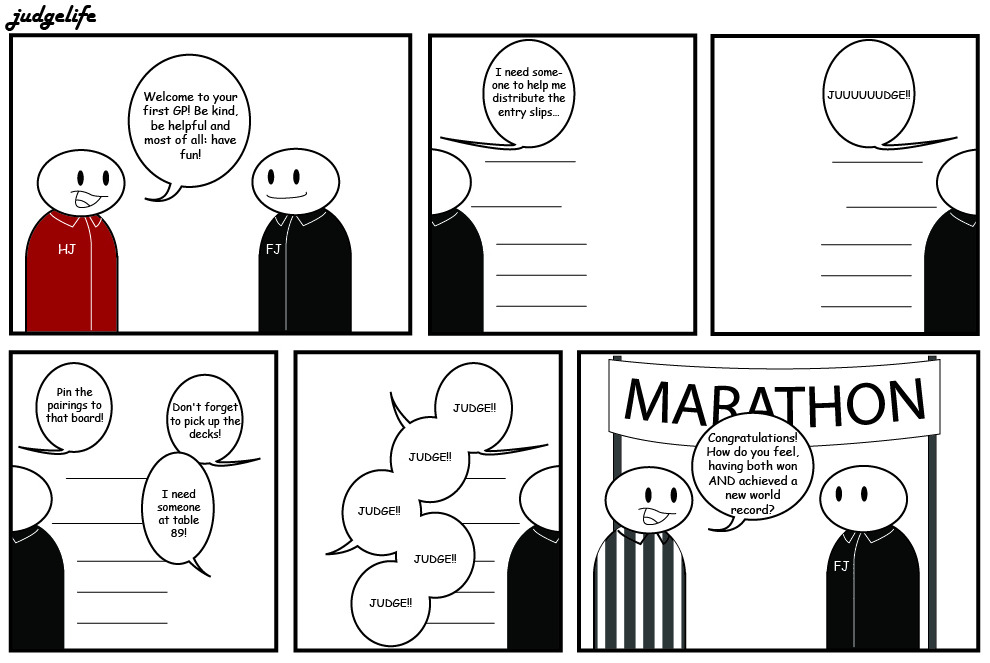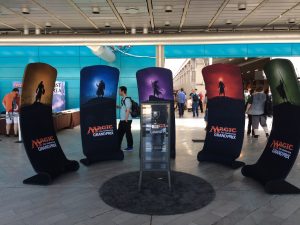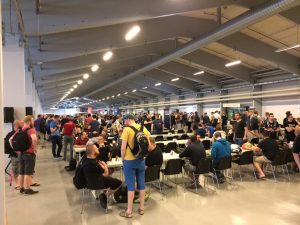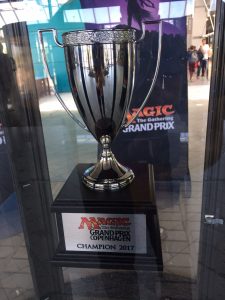I’ve been a level 2 judge for a little over 2 years. I’ve head judged quite a few PPTQs, I’ve tested new level 1 judges and been to quite a few national judge conferences. I’ve even arranged a national judge conference. You could say that I’m getting close to running out of “firsts”, and before Grand Prix Copenhagen I would probably have agreed with you. Now that I’m reviewing my notes and reflecting on everything I learned during that awesome weekend in Copenhagen, I’m leaning more towards saying that I’m not even close to running out of “firsts”.
Grand Prix Copenhagen was the first time I’ve judged at a GP, and only the second time I’ve ever been to one, the first time being GP Copenhagen in 2015. Needless to say, I was pretty excited.
Part one: Friday – Socializing, burgers and legacy
 I got to Copenhagen on Thursday evening. I went straight to Jonas Breindahl’s apartment where I was staying for the weekend, together with Ulf Simonsen. After a brief tour of the apartment, we went out to Grillen Christianshavn where we met up with a bunch of other Danish judges for some high quality burgers, the best milkshake I’ve ever had and some Codenames.
I got to Copenhagen on Thursday evening. I went straight to Jonas Breindahl’s apartment where I was staying for the weekend, together with Ulf Simonsen. After a brief tour of the apartment, we went out to Grillen Christianshavn where we met up with a bunch of other Danish judges for some high quality burgers, the best milkshake I’ve ever had and some Codenames.
Friday morning we got up early. Ulf and Jonas were on the early shift and I had the day off, which meant that I had plenty of time to go to Fields and pick up some Compeed for my blisters.
Lesson number 1: Brand new shoes is a bad idea! Make sure that you wear your shoes for a week or two, or spend some time massaging them. I didn’t, and just from the tiny amount of walking I’d done Thursday evening and Friday morning, I had already gotten painful blisters on both of my feet.
Equipped with Compeed blister band aid, I was finally able to walk without pain, so I went back to the venue. I started exploring the venue and made sure I’d be able to point players in the right direction on Saturday and Sunday when I’d inevitably get asked a million times where to hand in match slips etc. I also played in the Legacy Double Up and the evening Modern scheduled event.
Part two: Saturday – Working the Main Event
Saturday morning was a bit of a rush. Alarm clocks are hard, but we managed to get to the venue only a few minutes late. The day started with the morning meeting with all the judges on staff, then we broke into our dedicated teams to get briefed by our respective team leaders.
I was on one of the two floor teams with Patrick (with a “C”) Ericsson as my team leader. My other team mates were Niklas Ek, Patrik (with a “K”) Fridland and fellow GP rookie Jesper Berntsson. I could not have wished for a better team. Patrik, Patrick and Niklas are experienced GP judges who are more than happy to share what they’ve learned and it was great to have another rookie on the team who could ask all the questions that I forgot to ask.
As the first round started, I learned my first lesson of the day: There’s a surprisingly large amount of players that oversleep. Have your Tardiness speech prepared, because you’re going to get a lot of judge calls about missing opponents. I also like to note the table numbers. 10 minutes into the round I would check all the tables I’d noted.
A lot of the judge calls you receive during the tournament are simple mistakes that are easy to fix. A lot of Game Rule Violations due to people being stressed and under pressure. They forget that you’re not allowed to play a Cinder Glade when you just played a Valakut 5 seconds earlier in the same turn, or that regenerating your creature does not save it from Path to Exile.
Other times, you are called to a table to a situation where you need to back up 1 (actually 2) draws, a Dark Confidant cast, a Combat Phase and a Raging Ravine activation. In these situations, protocol says that you need to consult a Head Judge or your team leader (depending on the HJ’s preferences). Here is how that particular judge call played out:
Me: “Hi there, how may I help?”
Tron: “My opponent attacked with his Raging Ravine, but forgot to tap his lands to pay, then cast a Dark Confidant using 2 of the lands that were supposed to be tapped”
Me: “Ok, considering he’s only got 6 lands in play, 1 of them being the Raging Ravine, the mana certainly doesn’t add up. Can you please walk me through exactly what happened?”
Both of them then proceeds to walk me through what happened. It is currently Tron players turn, he has just untapped and drawn a card. During Jund players turn, he had put his Raging Ravine to the front, put 4 lands to the side and tapped them, then untapped/tapped them a couple of times while making sure he tapped his lands correctly. The 4 lands he had decided on were laying separately. After combat, he then tapped two of those lands to play a Dark Confidant and passed the turn.
This looks like a simple back up, right? Put a random card from Tron player’s hand on top of his library, tap the lands that where tapped during Jund player’s turn, return Dark Confidant to Jund player’s hand, undo the combat phase and leave the game in Jund player’s main phase 1.
I tell the players I’d like to back up the game, but I will need the HJ’s approval so I will be right back.
I then leave the table and find Kevin Deprez, tell him about the situation and my proposed back up. I get an approval on the back up, but he’d like to come to the table as well and double check.
Queue lesson number two: Always write down the table number!
After wasting about a minute or two looking for the table, we find it and Kevin starts investigating. There was a minor detail that I’d missed, which was the fact that there was a creature in the top of Tron player’s library. Oh, and that creature was a Thought Knot Seer which, as it turns out, had actually blocked the Raging Ravine and the Jund player did indeed draw a card. No worries though, Kevin is a magician when it comes to back-ups, so while I was writing down everything I had done wrong during the call, Kevin fixed the situation. Afterwards, I sheepishly explained to Kevin everything I had done wrong and how I’m going to do it correctly in the future. Debriefing is important!
Here’s the key things I learned from that call:
- Either write down the table number, or steal the match slip before leaving the table.
- Make sure to complete your investigation. In this case, I forgot to ask if anything happened during combat.
- Write down everything that happened in chronological order. This makes it so much easier to do the back-up.
The last lesson from Saturday I want to share isn’t really rules related, but a tip I got from Patrik and Niklas. Take care of your feet! During your break, take off your shoes, open them up and let them air out. Take your socks off as well and let the sweat dry off of your feet. Bringing an extra pair of socks is even better. Putting on a fresh pair of socks after your break is like putting on a new pair of feet. It gives a nice mental energy boost as well.
Part three: Sunday – No, you can’t just pick up your library and search it
Sunday, day two of the GP and also a lot of people’s first experience with Pro REL, myself included! My team is assigned the mid to lower tables, which is also where most of the action happens. Players at the mid tables are in contention for prizes and pro points, so the games can be quite cutthroat. The players are a combination of serious competitive veterans and GP first timers.
Speaking of first timers; my first judge call of the day was a player who had forgotten to de-sideboard the night before after round 9. He discovered it when he drew a Rest in Peace. This was the first time I got to apply the new Deck Problem fix, and I must admit, I really like it. I went to the Deck Check Team and got his decklist (after writing down his name and table number of course), confirmed his DCI number matched what was registered on the decklist (to make sure I had the right one before showing it to him) and we proceeded to remove all the sideboard cards from his maindeck and shuffle in the missing cards. With the old IPG, this would have been a game loss and sad faces, instead, he gets a warning and loses one card in hand, but gets to keep playing.
The next call I want to share is the one I named this part after. I get called to a table with Burn vs. Lantern Control. The players start explaining the problem. Apparently, the burn player had been resolving a fetch land and while searching his library, he muttered “well, that’s it” and then proceeded to shuffle his library, present it, opponent shuffles and they reveal the top card (courtesy of the Lantern of Insight in play). They then proceed to chit chat a bit, and the lantern player then asked the burn player “wait, by ‘that’s it’ do you mean that you want to concede?” The burn player then replies “no, I just didn’t have any more targets for my fetch land, but I can check if I have enough burn left to possibly kill you” You can probably guess where this is going, right? He then proceeds to pick up his library and start looking through it.
In retrospect, “Wait, you did WHAT?” probably shouldn’t be the first question you ask, but in my defense, I was more than a little flabbergasted that I would have to explain to a player on day two that you can’t just look through your library. In the end, I ended up giving him a warning for looking at extra cards and shuffling the random part of his library. I probably should have involved a head judge, but at that time, I put it down to the player being visibly frustrated. His hand was empty and the lantern player had the lock in place but was at a very low life total.
If I ever do encounter a situation like this again in the future, I’m definitely going to get a second opinion, either from my team leader or a head judge.
The rest of the rounds went pretty smooth, some requests for oracle texts, a back-up involving a Tron player skipping the blockers and damage steps after attacking with Ulamog and a few simple GRVs and LECs. The Ulamog back-up was done correctly this time. I had remembered my lesson from Saturday and made sure to write everything down, including the table number. In total, initial investigation + finding a head judge + doing the back-up only took me 4 minutes. It’s amazing what good notes and asking the right questions can do.
During round 15 though, I was called to a table by both a player and a spectator (!). The spectator proudly tells me how he noticed that player 1 had missed his Duskwatch Recruiter transform trigger in player 2’s upkeep, so he stopped the game, told the players what was wrong and then they called a judge.
Whoops…..
See, the thing about Professional REL is that spectators are not allowed to interfere with an ongoing match, ever.
You’re also not supposed to point out missed triggers to the players (this also applies during Comp REL).
Luckily, the game had only progressed to player 2’s main phase 1. A werewolf transform trigger is not a detrimental effect, so no warning is given and we ask player 2 if he wanted the trigger to be placed on the stack. Player 1 had a Devoted Druid in play, so you can probably guess why player 2 opted to have the trigger put on the stack.
Now for the part where I learned a lot.
I told the players that I was done with their part so they are free to resume playing. Then I told the spectator that I needed a talk with him. I explained that at Professional REL, it was not allowed for spectators to interfere with an ongoing game and that pointing out missed triggers is also considered Outside Assistance. He asked me what the penalty was, and I said I believe it can be anything from a warning to match loss depending on the situation, but I need to double check the IPG first. As soon as I had pulled out my phone, I noticed that I was being shadowed by another judge, so I opted for taking his advice instead. After a short conversation we agreed that this was indeed a case of outside assistance and the penalty is a match loss. Issuing a match loss requires the approval of a head judge, so I asked my colleague to stay with the spectator while I fetched a head judge. I found him at the top tables, told him I needed him for a minute and that I believe I had a case of Outside Assistance. The head judge talks with the spectator and ends with the same conclusion as me. My colleague gets the player’s name and DCI number and the player is enrolled in the tournament, issued a match loss and then dropped from the tournament.
After this whole debacle is over, I sit down with the judge who assisted me and talk about what happened. I’ve never had to deal with outside assistance before, so we talked a bit about how to handle it and that it’s possible that I might have had a few cases of it at past tournaments, but not actually looked for it. We also discussed the topic of looking up the IPG in front of players and ended up agreeing that in the future, I should always take a few steps away when doing so. Letting the players see what topics you are checking can in some situations be stressing for the players and it also looks a tiny bit unprofessional. If the player sees which sections you are looking up, it can possibly affect how they are going to respond to your questions, and in the worst case, it can make them change their story if they fear a heavy penalty and want to avoid it.
Conclusion – I. Want. More!
GP Copenhagen was absolutely amazing. I met a lot of new people, got to see some friends I rarely see, learned a lot of new things – more than I can possibly share in a single report, and I got to watch a ton of magic!
Judging such a huge event is at the same time extremely different but also the same as head judging PPTQs. The judge calls are quite often the same as the ones you’re used to, there’s just a lot more of them. Your investigation process is the same; find out the relevant facts, find the error, give the proper penalty and apply the corresponding fix. There’s a lot more logistics going on, and the floor you have to keep an eye on is a lot bigger. There’s also a lot more people on staff, but you’re not expected to know everything that’s going on. You will be asked about stuff that you don’t know, but it’s ok to tell the guy asking about on-demand 2HG that you don’t know, but the guys sitting under the huge “On-Demand Events” sign can answer all his questions.
Judging a GP is a completely new experience and a completely new world. It’s a world that I can’t wait to explore more of.



